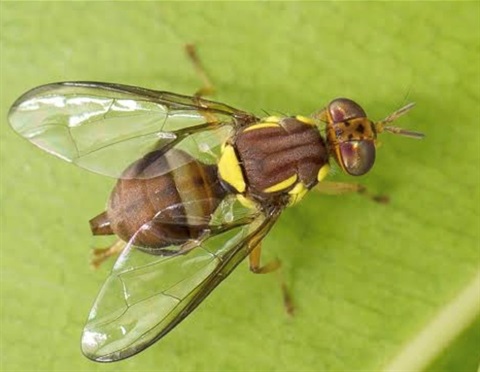Pest Management - Fruit Fly

Fruit fly can be a significant issue in our towns, with many gardens having fruit trees to produce fresh fruit for residents. However, they pose a significant risk for nearby fruit trees and susceptible fruiting vegetables such as tomatoes if they are not managed.
We ask that if you think you have fruit fly larvae in your garden produce and are in the Shire of Yarriambiack could you contact Agriculture Victoria on 136 186.
The impact on your garden
Fruit fly larvae (maggots) cause your fruit and vegetables to turn into a soft, mushy mess. Adult female fruit flies lay eggs in the flesh of ripening and ripe fruits and vegetables. Once the eggs hatch, the larvae feeds on the fruit, causing it to rot and drop to the ground. This damage will make your fruit inedible.
Just one fruit fly can cause an outbreak.
Female fruit flies can lay 500 to 800 eggs in their six-month life. Fruit flies emerge, feed and mate in two to four days in summer and they hatch in just six to eight days.
This can translate in 700,000 flies in one season originating from just one fly.
Help keep Yarriambiack fruit fly free
Fruit flies destroy fruit and vegetables grown commercially and in home gardens. Commercial growers have put strategies in place to control fruit fly in their crops, but they cannot control outbreaks in home gardens.
Detection
Regularly inspect your home-grown fruit and vegetable for larvae. Fruit and vegetables will need to be cut open to detect larvae. Common fruit fly host plants are:
- peach
- apricot
- plum
- nectarine
- orange
- lemon
- grapefruit
- avocado
- apple
- pear
- loquat
- quince
- tomato
- chilli
- capsicum
- grapes
Prevention
Remember than fruit fly activity is not strictly seasonal, and if you have host fruit trees on your property you should:
- Prune them regularly, keeping the tops of the trees to a manageable height so that you can pick all the fruit and more easily manage your trees for netting, spraying and baiting.
- Remove fruit as it ripens and certainly before it falls to the ground.
- Collect fallen fruit immediately, place any unwanted fruit into a sealed plastic bag, and leave it in the sun for five to seven days to kill any fruit fly maggots that might be present. The bagged fruit should then be put into your rubbish bin. Or you can microwave the fruit in small quantities.
- Do not place unwanted or infested fruit into your compost bin.
- Treat unwanted fruit and vegetables from other fruit fly host plants in the same way.
- Consider baiting, cover spraying and trapping methods, available from most garden and hardware shops and local chemical suppliers.
- Consider methods to isolate your fruit from fruit flies, like fine netting, sleeves or bags.
- If you don’t have the means to take care of your trees, consider removing them.
- Encourage your neighbours to manage their host plants too and help each other if you’re away for long periods of time.
Resources